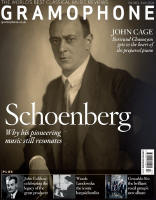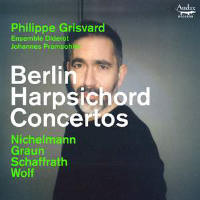Texte paru dans: / Appeared in:
|
|
|
|
|
|
The mid-18thcentury Berlin court of Frederick the Great has been much visited by recording artists over the years, such that any interested person can by now have a pretty good idea of the kind of sound its music made. The composer working there most famous among modernday listeners is Carl Philipp Emanuel Bach, but he gets the day off on this occasion, even though harpsichord concertos were very much his thing. Instead, Ensemble Diderot focus on seeking out lesser-known composers who turn out to have been well capable of producing a harpsichord concerto worthy of a 21st-century showing; all the works on this release are getting premiere recordings.
That Berlin sound – a mixture of galant decorum, proto-Romantic inward emotion and brisk energy driven by repeated-note bass lines and bustling melodies – is the clear order of the day. Christoph Nichelmann, a Leipzig pupil of JS Bach who followed CPE to the Berlin court, serves up a D minor Concerto so like one of Emanuel’s that it has been attributed to him in other sources. So, too, has the B flat
Concerto by Ernst Wilhelm Wolf, not actually a Berlin musician but one who in his time in Gotha, Leipzig and Weimar was happy to admire its composers from afar, even to the extent of penning a slow movement in the sombrely brooding, empfindsamer style that always has seemed one of CPE’s particular gifts. Christoph Schaffrath, who worked for Frederick and then his musical sister Princess Anna Amalia, seems to have been more affected by Bach the father; the first movement of his C minor Concerto even has a sternly fugal ritornello, though within an overall style that is still galant. Court Kapellmeister Carl Heinrich Graun – better known for his operas – is represented by a D major Concerto with a bright and graceful early Classical feel.
These fine performances are surely everything the composers could have asked for. Soloist Philippe Grisvard has energy and precision, but at the same time the singing tone and intelligent ornamentation the music needs to keep it alive; no pitchless knitting-needle stuff here. The one-to-apart orchestra is open and clear yet also gives a sound that is warmly resonant and full of bounce. Another fine release from an ensemble that just loves to rediscover forgotten treasures. |
|




